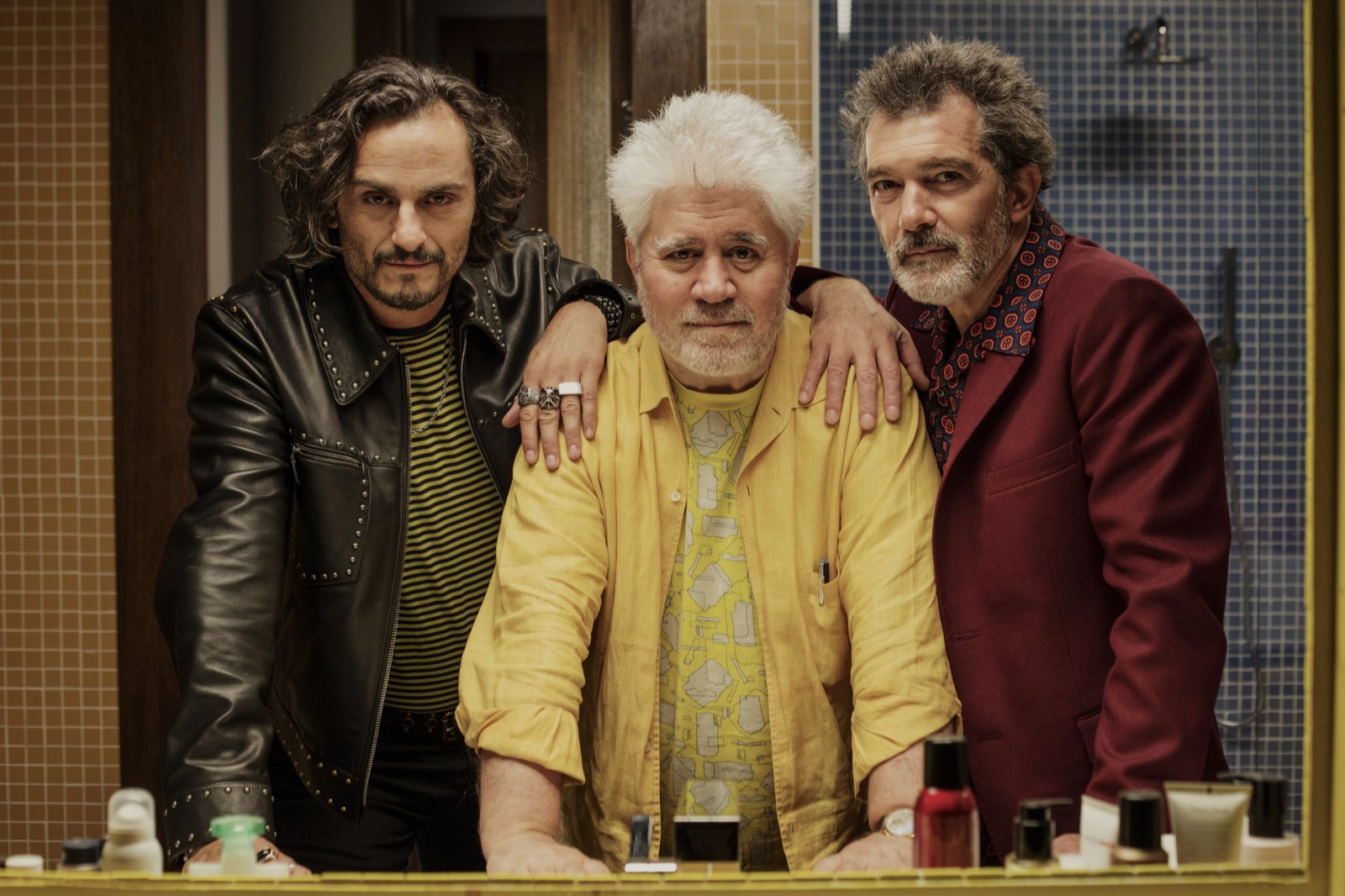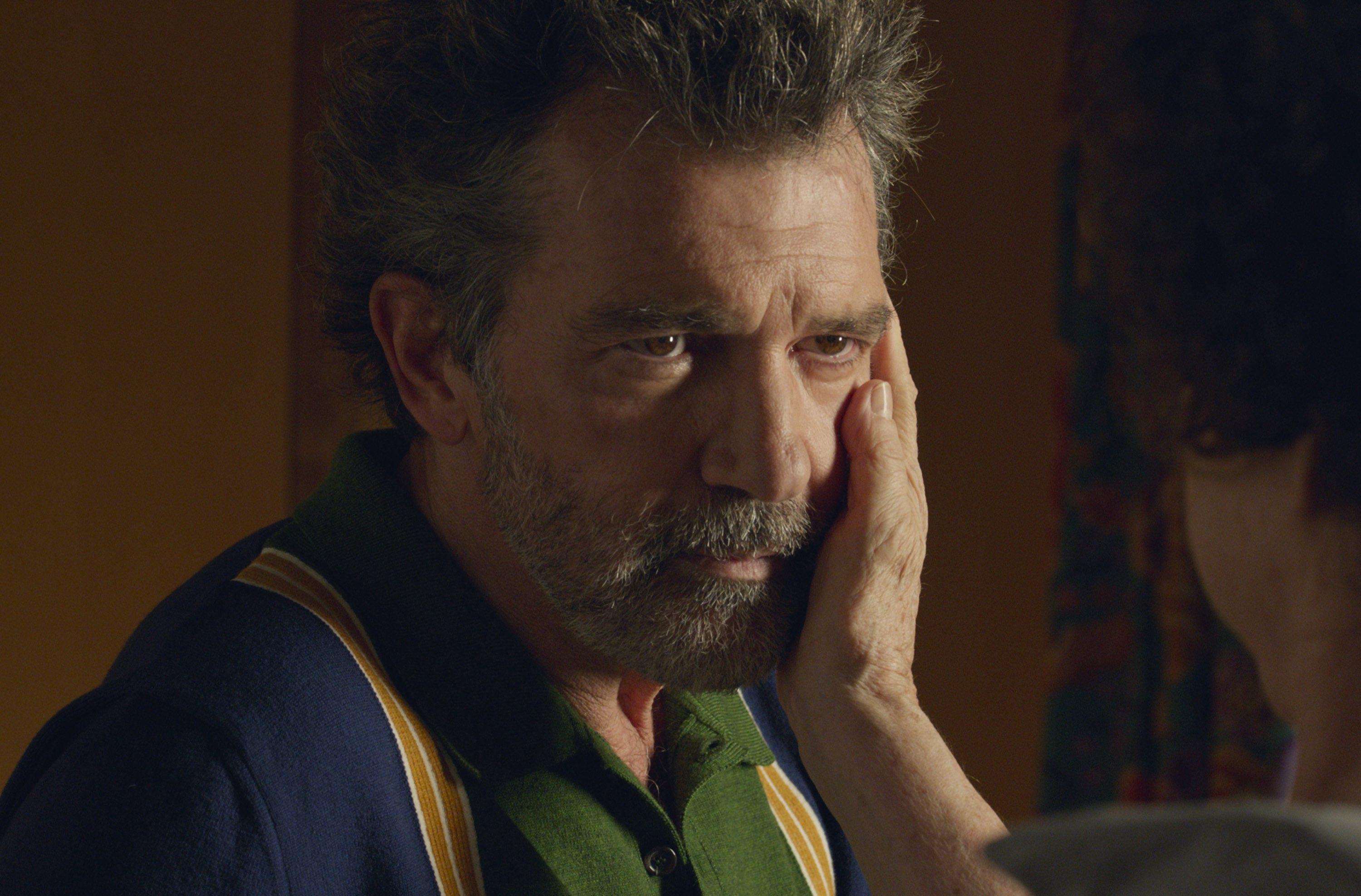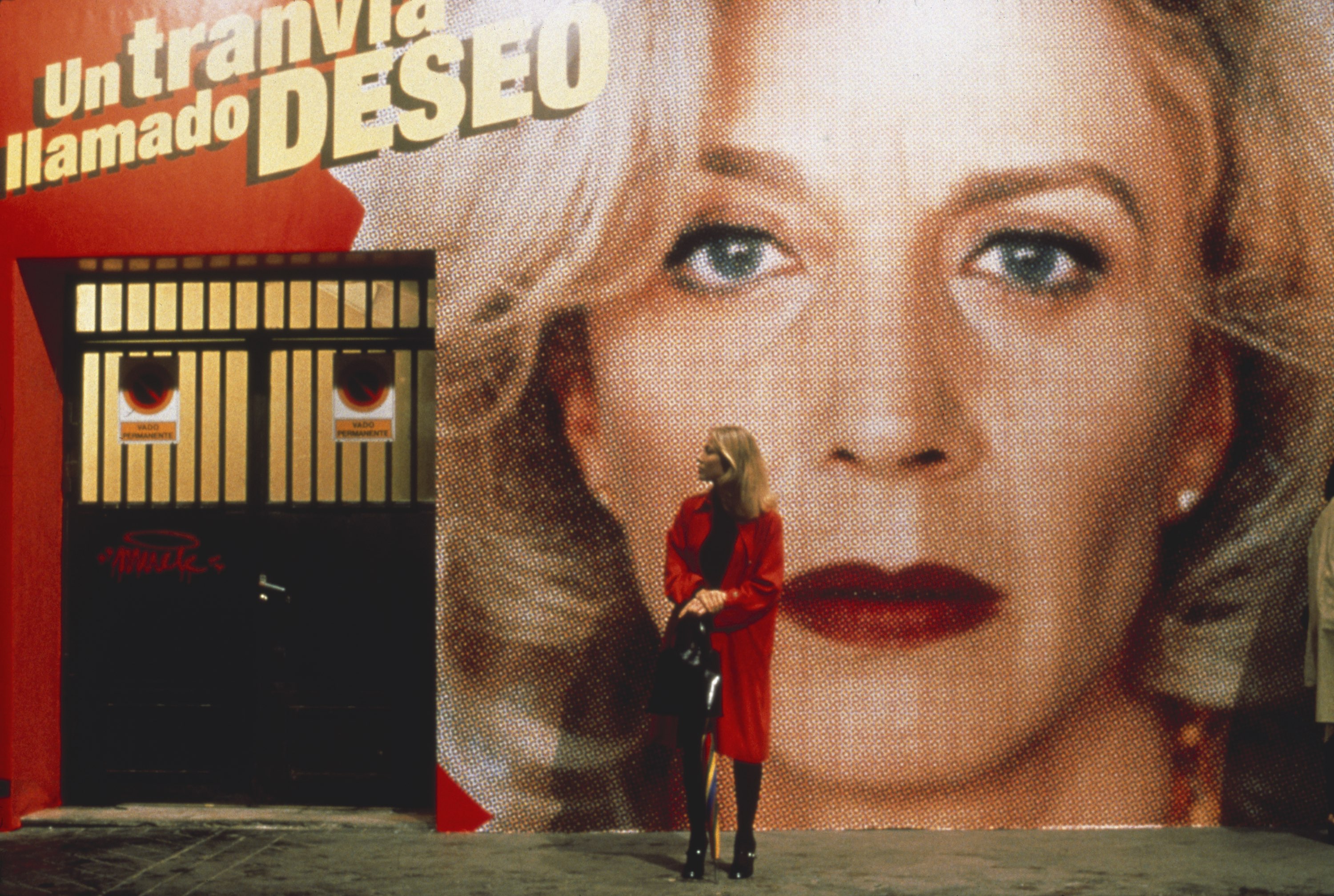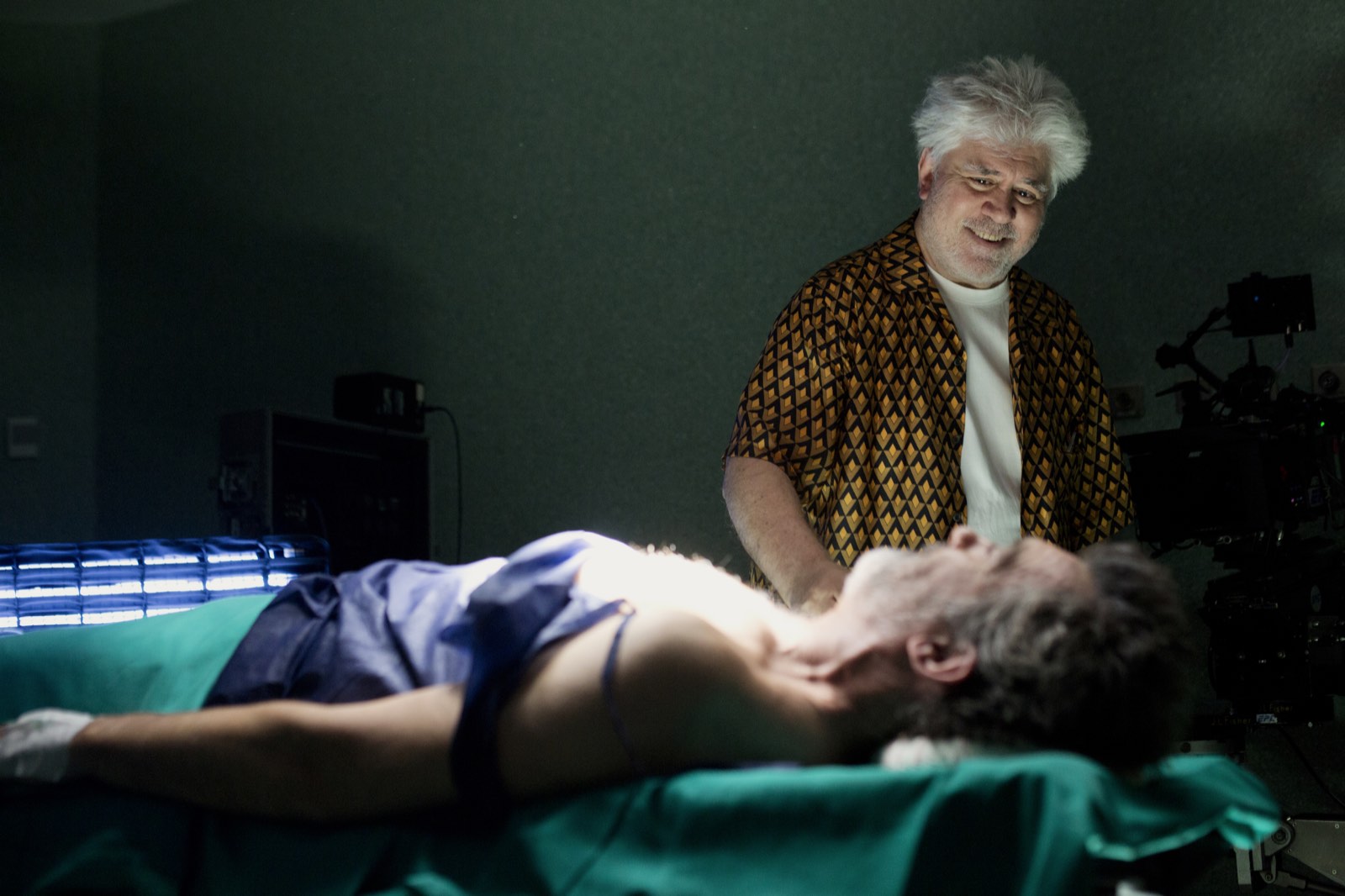

The collective experience of audiences in a cinema watching great films is at the heart of what Park Circus is about. We love films, shared stories and escapism, and we like to ask some of our friends from across the film industry to recommend some of their favourite films for audiences to enjoy on the big screen.
This month, our Guest Picks focus is on one of cinema's most visionary directors whose highly-acclaimed new film, Parallel Mothers, is now in cinemas.
Nobody makes films quite like Pedro Almodóvar, so we asked esteemed academic, critic, and curator of Spanish language film and theatre, Professor Maria Delgado, to give us her top Almodrama picks from the sensational director's colour co-ordinated career...
"Who doesn’t love the work of Pedro Almodóvar? The glorious colours, the sharp décor and witty costume design, the exuberant performances — at once larger than life but also humane and able to capture the broadest range of human emotions. Almodóvar makes films about the joys of and pains of being alive: birth and death; relationships gone awry; the perils of obsession; the thrills of love and the darker sides of desire.
At their core are some of the great character creations of the past 40 something years – from the bubbly title protagonist played by the late Verónica Forqué in his tenth film, the black comedy Kika (1993), to the suave but menacing surgeon played by Antonio Banderas in the psychological thriller La piel que habito / The Skin I Live In (2011).
Here are ten of his films to look out for, a taster if you like, because picking ten films in a consistently impressive body of work is not easy. The ten films featured below chart the journey of a new Spain emerging from a long dictatorship (1939-75) as well as the trajectory of one of the most extraordinary filmmakers of our times.
Entre tinieblas / Dark Habits (1983)
Pepi, Luci, Bom may have been the film where it all began with its trio of female leads bringing a new energy and irreverence to Spanish cinema, but Dark Habits is a hidden gem, offering snippets of the traits so visible in his later work – the tracking shot, the role of costume, and the attention to character. The casting of theatre veterans Mary Carrillo, Marisa Paredes, Julieta Serrano as the wizened Marchioness, the reformed killer Sor Estiércol (Sister Manure) and the junkie Mother Superior respectively demonstrated a heightened interest in the boundaries between character, performer and role. Serrano and Paredes went on to become Almodóvar regulars alongside Chus Lampreave, who delights as Sor Rata (Sister Rat), the author of a series of racy novels, and Carmen Maura whose Sor Perdida (Sister Sinner or Sister Lost) boasts a pet tiger and an overly keen interest in cleaning. A wonderfully moving, funny, witty, and irreverent film about female agency.
¿Qué he hecho y para merecer esto? / What have I done to deserve this? (1984)
A different kind of female agency comes in to play in Almodóvar’s fourth film as Carmen Maura’s put-upon Gloria, a working mother, struggles to manage the many demands on her time made by her cleaning jobs and her demanding home conditions: an angry husband, two wayward sons, and an opinionated mother-in-law (the glorious Chus Lampreave) who longs to return to her village with her pesky pet lizard. Verónica Forqué offers a breath of energy as Gloria’s bubbly neighbour whose employment as a prostitute brings some unusual visitors into the building. Almodóvar put Madrid on the cinematic map with his films – here he shows a far less stylish Madrid than that of Matador or The Law of Desire, instead focusing on the drab public housing built on the outskirts of the city during the Franco regime. Neo-realist vibes merge with comedy to potent effect in a film firmly centred on the pains and perils of motherhood, putting firmly centre stage the experiences of women whose lives had too often been marginalised or erased during the Franco regime.
La Ley del Deseo / The Law of Desire (1987)
A seminal film for understanding Almodóvar’s cinema and key themes, like the later La mala educación/ Bad Education (2004) and Dolor y gloria / Pain and Glory (2019), this is one of the Manchegan filmmaker’s most autobiographical works.
A film inspired by moments of his life, it has at its centre a fateful love triangle that pits filmmaker Pablo (Eusebio Poncela), his trans sister Tina (immortalised by Carmen Maura) and a crazed fan of the former, Antonio (Antonio Banderas in arguably his breakthrough role) in a fateful love triangle. Ghosts of Hitchcock and Hollywood melodrama hover over the film but the result is something uniquely original, camp, and uncompromising that firmly placed Almodóvar and Banderas on the international map.
The stylistic auteurism that the Cuban novelist Cabrera Infante termed Almodrama positioned Almodóvar as a unique political voice in world cinema – a filmmaker with a queer style all of his own. The film also features one of the filmmaker’s most iconic and sublime scenes, as Tina asks a refuge collector to hose her down on a hot summer Madrid night, crying out in delight as her orange dress clings to her body. A deeply moving film about the limits of desire.

Dolor y gloria / Pain and Glory (2019) - Image courtesy of Pathe UK
Mujeres al borde de un ataque de nervios / Women on the Verge of a Nervous Breakdown (1988).
Almodóvar followed the divine The Law of Desire with a wacky, modern screwball comedy featuring a terrific ensemble cast and a gloriously inventive plot. Carmen Maura excels as Pepa – a dubbing actor ceremoniously dumped by her lover, Iván just as she is trying to tell him that she is pregnant. Her search for the absent Iván takes her on a wild and wonderful journey, bringing her into contact with his son (Banderas, shining as the shy Carlos), the latter’s fiancée Marisa (a prim and proper Rossy de Palma), and Iván’s dangerous ex-wife (Julieta Serrano). And while Pepa desperately seeks Iván, her friend Candela (María Barranco) is shocked to find her lover is a wanted terrorist. There’s an energy to the narrative, a wit to the performances, and a terrific production design of vibrant in-yer-face colours. And who can forget Candela’s coffee pot earrings or a recipe for gazpacho with a few unexpected additions? Madrid has rarely looked more enticing. A contemporary classic.
La flor de mi secreto / The Flower of my Secret (1995) marked a more sombre Almodóvar offering a new realistic dimension to his filmmaking and initiating what is seen by critics as his mature ‘blue’ period.
At the core of the film lies Marisa Paredes’ novelist Leo, navigating a personal crisis that involves asking questions of herself as a successful but unhappy romantic novelist writing under a pseudonym and trying to salvage a disintegrating marriage to suave army officer husband Paco (Labyrinth of Passions’ Imanol Arias). A new guardian angel comes into her life, editor Angel (played by Juan Echanove) offering her new opportunities and a burgeoning friendship. Paredes is sensational in the role of Leo and there’s terrific comic interludes in the relationship between her warring mother and sister (the dynamic duo of Chus Lampreave and Rossy de Palma). Set against the backdrop of political unrest, this is one of Almodóvar’s most accomplished films – a film that also takes the viewer to his home region of La Mancha which also features more prominently in Volver. Look out also for a dynamic cameo appearance by flamenco sensation Joaquín Cortés.
Todo sobre mi madre / All About my Mother (1999) sees Almodóvar leave Madrid for Barcelona in a terrific story of motherhood, grief and female friendship.
Argentine actress Cecilia Roth – who appeared in his early features – excels in the role of Manuela, a nurse who faces a terrible decision when her son, Esteban, is knocked down after a visit to the theatre. Her new life in Barcelona in search of Esteban’s father brings her into contact with an old friend La Agrado (a delightful Antonia San Juan), as well as Penélope Cruz’s compassionate nun, Sister Rosa, glamorous actress Huma Rojo (Marisa Paredes) and the latter’s tormented girlfriend (Candela Peña). High theatrics, bold melodrama, and a wonderfully political undertone create a film of immense humanity where the marginalised literally take centre stage. While literary concerns underpinned The Flower of my Secret, theatre and the theatrical are never far from the surface in All About My Mother as performances of works by Federico García Lorca and Tennessee Williams further comment on the film’s key themes

Todo sobre mi madre / All About my Mother (1999) – Image courtesy of Pathé
Hable con ella / Talk to Her (2002).
Almodóvar’s films are known for their feisty woman protagonists but a conspicuous number of his films have complex male characters at their core. Talk to Her is one of the very best of these, bringing together Javier Cámara and Dario Grandinetti in parallel narratives about two very different men caring for women in comas. Cámara is superb as the camp, conscientious male nurse Benigno, while Grandinetti offers a counterpoint as the elusive travel writer Marco. The friendship that develops between the men is tender and affecting, and while the film handles difficult subject matter, Almodóvar isn’t afraid to ask questions of his protagonists’ motifs and transgressions. The opening of the film, featuring Marco’s response to Pina Bausch’s iconic dance work Café Müller is just breathtaking.
Volver (2008)
There’s more than a nod to the plot of What Have I Done to Deserve This? in Almodóvar’s sixteenth film – a bittersweet comedy cum ghost story that moves between Madrid and La Mancha. Penélope Cruz’s Raimunda – with a nod to Sophia Loren -- finds herself with a problem on her hands when her boorish husband meets an untimely end. And it is through female friendship and support that she finds a way through her predicament. Raimunda is at the centre of a wonderfully intricate set of women-centred relationships – with her sister Sole (Lola Dueñas), her aunt Paula (Chus Lampreave), her daughter Paola (Yohana Cobo), dying neighbour Agustina (Blanca Portillo), and the ghost of her mother (a return for Carmen Maura). The six actresses collectively took the Best Actress Award at the 2006 Cannes Film Festival for their performances in a film about what it means ‘to return’ (the English translation of the film’s title) and the importance of coming to terms with the past.

Volver (2008) - Image courtesy of Pathe UK
Dolor y gloria / Pain and Glory (2019).
It’s possible to see Pain and Glory as part of a cluster of films that includes The Law of Desire, Bad Education and Los abrazos rotos / Broken Embraces (2009) about male directors navigating a deep emotional crisis.
Antonio Banderas, in his eighth collaboration with Almodóvar, gives a career-defining performance as a filmmaker taking a long hard look at his life. Looking back at his childhood and recalling his earliest sexual desire, Salvador offers more than a passing nod to Almodóvar’s own sensibilities and life experiences. Fluid movement across time – the film is set in 2018 and the 1960s -- provides a seamless narrative where past and present intersect in Salvador’s consciousness.
Colour, light, and song infuse the memories of ‘60s Palencia rooted in the home life overseen by luminous Jacinta (one of Penélope Cruz’s neorealist mothers). Asier Flores as the young Salvador is one in a long line of wide-eyed child protagonists in Spanish cinema disarming with his incisive gaze and sharp intelligence. Banderas as the adult Salvador has never been better – a lean, resonant performance that points to the pain of unresolved affairs of the heart. It is possible to read the film as Almodóvar’s 8½, but the journey into the past is one that ultimately leads to a better understanding of the present. The pervasive power of the Church, as in Bad Education, is never far from the surface. And the 1980s – such a formative decade both in Almodóvar’s life and in the wider body politic of Spain – haunts the film.

Behind the scenes of Pain and Glory – Image courtesy of Pathe UK
Madres paralelas / Parallel Mothers (2021)
Almodóvar’s 23rd film is arguably his most overly political work to date – a work that grapples with the issue of Spain’s mass graves. Over 114,000 disappeared persons – civilians shot by Franco’s Rebel forces in extrajudicial executions during the Spanish Civil War and its aftermath. Penélope Cruz won Best Actress at the Venice Film Festival for her performance as a photographer, Janis, looking to excavate the grave where her great-grandfather is thought to lie. Parallel narratives intersect as Janis realises that her principles are compromised by the secrets she keeps from Ana, a young woman she meets in the hospital – newcomer Milena Smit — while giving birth to her baby daughter Cecilia. This is an important film that argues for a nation’s need to understand its history however complex or difficult. A healthy dose of melodrama cuts across a drama that celebrates Spain’s culture - from the culinary to the theatrical – and recognises the importance of an ethical engagement with the past. Parallel Mothers offers Cruz – in her eighth collaboration with Almodóvar – arguably her most complex role to date. Director of Photography José Luis Alcaine shapes what Almodóvar terms ‘a very luminous photography for a sombre story’ and composer Alberto Iglesias – a collaborator since The Flower of My Secret – once more provides a sublime musical dialogue with the story."
Maria Delgado is an academic, critic and programmer. She is Vice-Principal (Research and Knowledge Exchange) at The Royal Central School of Speech and Drama, University of London and has published widely on Twentieth and Twenty-First Century Spanish and Catalan-language theatre and film. She is also a programme advisor for the London Film Festival. To read more on Parallel Mothers by Maria, look at her interview with Pedro Almodóvar in the March 2022 issue of Sight & Sound.
View our Almodrama collection




